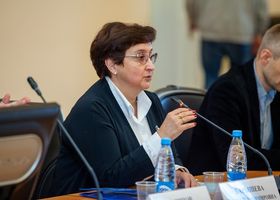
01.12.2020
Professor Elena Barysheva, Chair of the Department of History and Theory of Historical Science, spoke about the education and work of the Faculty of History.
— The rating of Russian higher education in history has always been very high. How do you explain such stable interest in historical education?
— I think this is due to the fact that it is a classical education in humanities. Most of the modern liberal arts majors have grown out of history. Today, turning to the historical past is becoming especially relevant.
Modern history is a socially responsible science: the historian is always in constant dialogue with society. Studying history provides students with the analytical skills essential for their future career.
— How does the Faculty of History of RSUH feel in the first year of existence? What challenges have you faced and what prospects do you see in the future?
— The year of creation of the Faculty coincided with a number of significant events. First of all, it is the 75th anniversary of the Victory. As a result, both the Faculty and the students immediately became involved in a series of social and academic events related to this significant date: the forum “My country. My story. My Victory ", which included a meeting with Mr. Valery Falkov, Minister of Science and Higher Education of the Russian Federation, and the opening of the exhibition "Memory of Generations" in the Historical Park "Russia - My History ", and a number of conferences and round tables.
The second memorable date was the 90th anniversary of the Institute of History and Archives, the alma mater of many generations of Russian historians, which included many academic events.
Of course, the epidemiological situation intervened, but it could not stop the flow of events and education: students attend classes, participate in conferences, and the Club of Young Historians continues its work.
Our plans for this year are extensive, as always: introduction of new Master's programs and renewal of the Bachelor's tracks in History and Public Policy and Social Sciences.
It is very important for our students to have an idea of their future profession. To this end, we will continue to acquaint them with professional historians and state officials at master classes.
We hope that the coronavirus will soon become a thing of the past, and students will be able to express themselves in more creative activities.
The faculty have many ideas of their own. Among them are the holding of new conferences, publication of collective monographs and collections of papers.
— For the sake of future applicants and those with an undeclared major, could you tell us about the educational tracks provided by the Faculty?
The Faculty offers a number of unique programs:
— Did the remote format of the admissions campaign influence the applicants’ decisions in 2020?
— Of course, it did, but not in a negative way. Applicants from different parts of the country asked questions by e-mail, and this facilitated our interaction with them. And the fact that they could also submit documents online also contributed to an increase in the number of applications. Quantity is routinely followed by quality: the average passing score has increased. This means that we were able to accept the best applicants.
— The applicants today – what are they like?
— The modern applicant has become more self-confident. They know what disciplines they wants to study. They are purposeful, they sometimes already have research interests and ideas about their future career.
— What other educational programs are implemented by the Faculty? What audience are they designed for?
— Our faculty actively and fruitfully cooperates with the Russian Historical Society. On September 5, 2020, an agreement was signed with the Historical Park "Russia - My History". An interaction with these organizations obliges our faculty to actively participate in the activities they offer and initiate their own educational projects. In particular, the faculty has developed and is currently actively implementing the project "Historical Memory", designed for a wide audience.